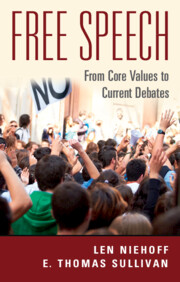Conclusion
Our Hazardous Freedom
Published online by Cambridge University Press: 30 April 2022
Summary
Imagine that a free speech absolutist and a free speech relativist enter into the sort of reasoned discussion that the marketplace of ideas envisions. Under the conventional framing of the marketplace of ideas model, their goal is to arrive at the truth. In the end, one will persuade the other that their view is the right one. Participants in debates over free expression often approach things in just such a manner.
- Type
- Chapter
- Information
- Free SpeechFrom Core Values to Current Debates, pp. 225 - 226Publisher: Cambridge University PressPrint publication year: 2022



